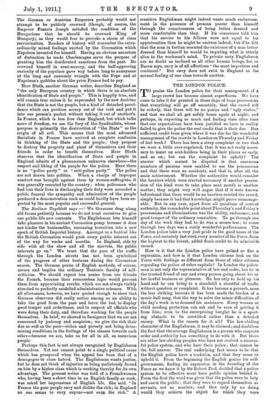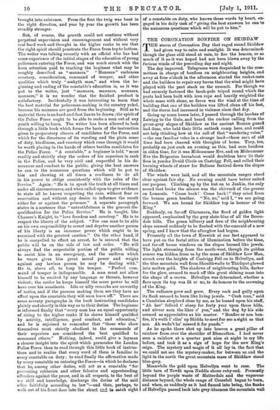THE LONDON POLICE.
TO praise the London police for their management of a large crowd has become almost superfluous. We have come to take it for granted in these days of huge processions that everything will go off smoothly, that the crowd will be orderly, that there will be no panics and "ugly rushes," and that we shall all get safely home again at night; and perhaps, in expecting so much and finding time after time that our expectations have been justified we have in reality failed to give the police the real credit that is their due. Has sufficient credit been given where it was due for the wonderful management of the crowds in London on Thursday and Friday of last week ? There has been a stray complaint or two that we were a little over-regulated, that it was not really neces- sary to insist on seat-holders being in their places so early, and so on ; but can the complaint be upheld? The answer which cannot be disputed is that enormous numbers of persons were enabled to see the processions and that there were no accidents, and that is, after all, the main achievement. Whether the authorities would consider the barriers which were erected necessary if another proces- sion of the kind were to take place next month is another matter; they might very well argue that if it were known beforehand that there would be no barriers erected the crowd, simply because it bad that knowledge, might prove unmanage- able. But in any case, apart from all questions of central authority, the remarkable point about Thursday's and Friday's processions and illuminations was the ability, endurance, and good temper of the ordinary constables. To go through one day of the work they had to do was a severe test; to come through two days was a really wonderful performance. The London police take a very just pride in the good name of the Force, and certainly last week every member of the Force, from the highest to the lowest, added fresh credit to its admiraLle record.
How is it that the London police have gained so fine a reputation, and how is it that London citizens look on the Force with feelings so different from those of other citizens regarding the police of other capitals ? In London the police- man is not only the representative of law and order, but he is the trusted friend of any and every person going about his or her lawful business or pleasure. He has only to hold up Lis hand and he can bring to a standstill a streetful of traffic without question or complaint. It has become a proverb, none the less striking because it has been made the burden of a music-hall song, that the way to solve the minor difficulties of the day's work is to demand his assistance. Every woman or child needing protection can ask and be sure of getting it from him; even to the enterprising burglar he is a sport- ing obstacle to be outwitted rather than a detested enemy. What is the reason for it all? The law-abiding character of the Englishman, it may be claimed ; and doubtless the fact that the average Englishman is a person who respects order and authority has something to do with it. But there are other law-abiding peoples who have not evolved a success- ful police system, and who hate their police ; that cannot be the full answer. The real underlying fact seems to be that the English police have a tradition, and that they mean to uphold it. From the beginning the English genius for self. government, finding its expression in the founding of the Force as we know it by Sir Robert Peel, decided that a police system to be effective must have public opinion behind it. From the first the word was given that the police were to help and assist the public; that they were to regard themselves as servants, not as masters; and that only by so doing would they achieve the object for which they were
brought into existence. From the first the twig was bent in the right direction, and year by year the growth has been steadily stronger.
But, of course, the growth could not continue without perpetual supervision and encouragement and without very real hard work and thought in the higher ranks to see that the right spirit should penetrate the Force from top to bottom. The writer was talking recently with an official who has had some experience of the initial stages of the education of young policemen entering the Force, and was much struck with the keen attention paid to teaching the beginner what may be roughly described as "manners." "Manners" embraces courtesy, consideration, command of temper, and other qualities which truly " makyth man," and when the be- ginning and ending of the constable's education is, as it was put to the writer, just " manners, manners, manners, manners," it is no wonder that the finished product is satisfactory. Incidentally it was interesting to learn that the best material for policeman-making is the country yokel, because his manners are good from the beginning. Still as to material there is no hard-and-fast line to be drawn ; the spirit of the Police Force ought to be able to make a man out of any youth willing to learn. The writer has been allowed to look through a little book which forms the basis of the instruction given to preparatory classes of candidates for the Force, and which for the directness of its wording and the plain sense of duty, kindliness, and courtesy which runs through it would be worth placing in the hands of others besides candidates for the Police Force. "A constable," a beginner is told, "must readily and strictly obey the orders of his superiors in rank in the Police, and be very civil and respectful in his de- meanour and conduct to the public, giving the best answers he can to the numerous questions which will be put to him and showing at all times a readiness to do all in his power to oblige consistently with the rules of the Service." Again : " He is to speak the truth at all times and under all circumstances, and when called upon to give evidence to state all he knows respecting the case, without fear or reservation and without any desire to influence the result either for or against the prisoner." A separate paragraph states in a sentence that " untruthfulness is the gravest dis- qualification for the Police Service." He is taught, like Chaucer's Knight, to "love freedom and courtesy." He is to respect the liberty of the subject. "For one man to be able on his own responsibility to arrest and deprive another person of his liberty is an immense power which ought to be exercised with the greatest caution." On the other hand, if he is compelled to effect an arrest, he is assured that the public will be on the side of law and order. "He will always find the respectable portion of the public willing to assist him in an emergency, and the uniform which he wears gives him great moral power and weight against any lawless person he may be dealing with." Ile is, above all, to keep his temper. " Perfect com- mand of temper is indispensable. A man must not allow himself to be excited by any language or threats, however violent; the cooler he keeps himself the more power he will have over his assailants. Idle or silly remarks are unworthy of notice, and if the persons making them see they have no effect upon the constable they will soon leave off." There are sonic seventy paragraphs in the book instructing candidates plainly and shortly in this way as to their duties. The beginner is informed finally that "every man has an equal opportunity of rising to the higher ranks if he shows himself qualified by activity, intelligence, good conduct, and education," and he is enjoined to remember that "those who show themselves most strictly obedient to the commands of their superiors are considered the best qualified to command others." Nothing, indeed, could give a layman a clearer insight into the spirit which permeates the London Police Force than to read through this little book of instruc- tions and to realize that every word of them is familiar to every constable on duty ; to read finally the affirmation made by every constable on entering the Force—in which he declares that he, among other duties, will act as a constable "for preventing robberies and other felonies and apprehending offenders against the peace, and in all respects, to the best of my skill and knowledge, discharge the duties of the said office faithfully according to law "—and then, perhaps, to walk out of his front door into the strt zr2, to catch sight
of a constable on duty, who knows those words by heart, en- gaged in his daily task of " giving the best answers he can to the numerous questions which will be put to him."















































 Previous page
Previous page